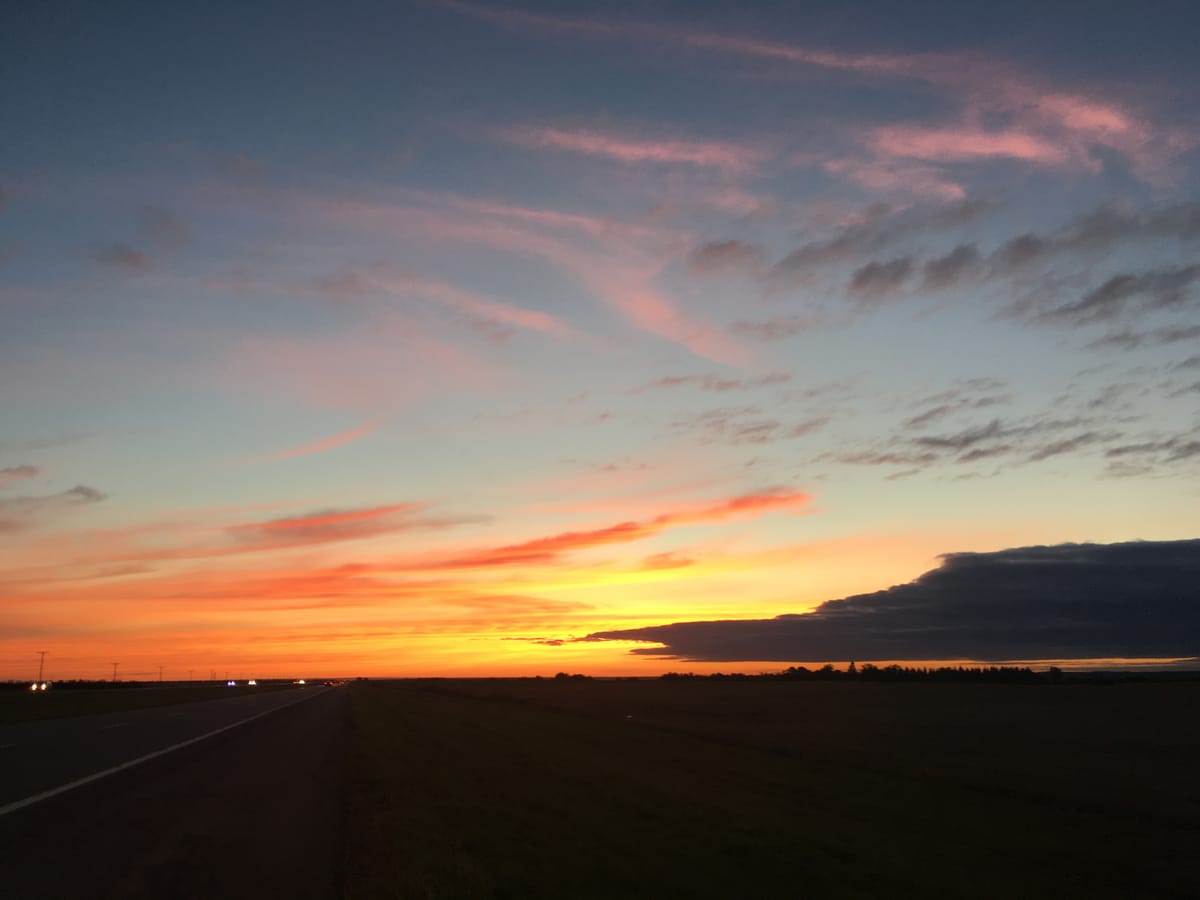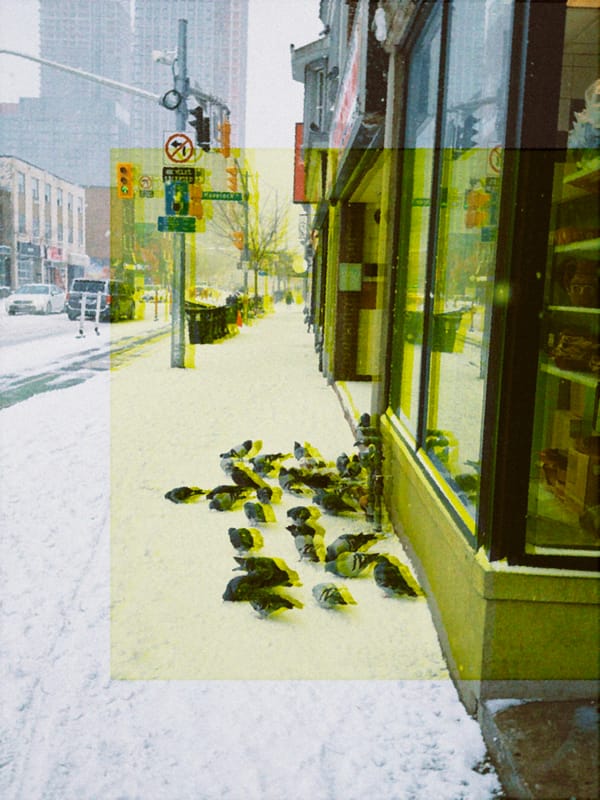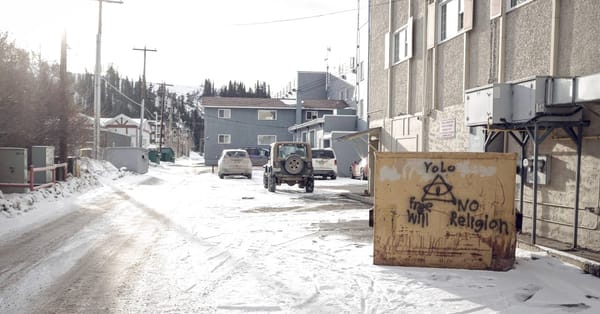These Frameworks Labeled Home

The Weakerthans second album, Left and Leaving, turned 25, and I am late celebrating it. I started writing this on the day of its anniversary with the best of clear-eyes intentions. I started and stopped sentences, cleaned out spelling mistakes, went back and recompiled half-considered paragraphs. I thought about the record, listened to it in headphones and on speakers, or through my phone placed delicately on the lid of stainless steel coffee tin while washing dishes in the light of the late afternoon. I thought about the record as each run through it turned back on itself in repetition, and then started it again. Listened through select favourites through AirPods on dog walks. Scraps of lyrics and tonal memories of hooks lingered in the room while I took naps soundtracked by its parts. It is still, despite all this, difficult to fully wrap my head around the whole truth of the record for me. It is part of the wind behind every movement, the walking and the dishes, the naps and the coffee and the thinking and the memories, and it hits me that it is not the anniversary of a record, so much as it is a memorial to the roots of ideas that inspired steps on old sidewalks. It is a love letter to a home that no longer belongs to me, and to the cities driven through and left behind.
I fell in love with punk rock at a young age because it felt like an external force, an invitation from hands unseen to thrash and be free that I was so blessed to bear witness too. It felt exciting and fresh and inviting, but it never quite felt like mine. Punk rock belonged to other people, people who lived in cities, near concrete pools drained in the summer and along busy highways that cut their way through the bones of old mountains and forgotten rivers. It wasn’t until I learned about bands whose provincial boundaries in Canada seeped into our own like ink on a page running together that punk rock felt like something that spoke to a home I knew.
I, like so many of my generation, was quickly enamoured with the pop/skate punk that grew in emboldened popularity by the rise of Green Day and the Offspring in the mid-90s. This new growth burst through the soil of SoCal punk rock and hardcore, led me to bands like NOFX, Face to Face, Bad Religion, Rancid and others who traded in a familiar style. Four chords ran through at breakneck speed over double kicks drums and sneering vocals. New discoveries found through used discs found at a record store that is no longer real. A building that saved and then built my young life.
There is always a record store with a kid working the counter who will change your life, and in 1997 I was saved by one working the counter at the good record store downtown on 4th Avenue, kitty-corner to the old Canadian Tire building. He sold me a Gob CD for six bucks, titled Too Late, No Friends (Mint Records, 1996). The standout hit from that CD, “Soda”, became a staple of eternal summer mixtapes. Gob has no real bearing on this story, but its important to lay a foundation and there would be nothing that follows without “Soda” crackling through the shitty speakers of every car I ran into the ground in the late 1990s. That same kid sold me a copy of Fat Music For Fat People, a Fat Wreck comp album released in 1994, and it burned through AA’s in my used off-brand silver Discman. That spinning wheel eating batteries introduced me to Winnipeg’s Propaghandi, and soon as I could scrabble the change together, I bought their debut, How To Clean Everything, from the used bin. Punk rock suddenly became something grown here at home, and it became shared air for eager lungs.
Growing up isolated and removed from the world in the Yukon, this cold dark corner of upper nowhere, left me feeling a great disconnect from the whole of the picture. As if the entire world was something else, something bigger, something for other people, and I was trapped in this hardened place. Frozen in time. Punk rock let me believe I had an edge with which to survive. In my youth, I pushed myself to never appear soft. Of all the things I have ever been afraid of in my life — water, flying, rollercoasters, being perceived — the appearance of softness came first. Isolated people often favour strength, as if a hard edge is the only reason any of us survived the wild bitterness of our surroundings. So I painted a hard, bitter edge on my face like a mask, and cut away at the softness until it was shredded and lost.
Winnipeg felt like home from a distance. Bigger certainly, closer to other cities and better situated, somewhat in the middle of the country where people and bands might drive through, or further still, stop. It felt connected to where we were in the north, a trans-Canada tether holding us together through our own shared feelings of isolation and self-preservation despite our harsh landscapes and systemic problems. Propaghandi spoke to the voice inside me that wanted to be seen as so sharp and so rough and so ready to cut and bleed, Chris Hannah’s voice the disaffected snarl I practiced in private to ward off any questions of my own hidden insecurities. But what emerged on the record was something else, some haunting vision that I could not shake, and it was there, in a verse on “Showdown (G.E./P.)” I first heard John K. Samson. His voice the soft counterweight to Hannah’s, like honey swirled in tea, not to disappear the bitterness but to add texture to the complexity of its flavour.
Shortly after I first discovered them, the angelic burnout kid at the record store told me that Samson had left Propaghandi and started a new project, called it The Weakerthans. A name that seemed to revel in the softness I had all but burned and buried. Under this new banner, Samson’s music simmered and built richness of flavour. Songs that were no less angry at the external forces that built walls around a body seeking growth, but the outward aggression turned inward, turned poetic and introspective and thoughtful. Meandering sometimes, but always with purpose. Songs that were wandering somewhere, if only just to think through the steps that lead to the end of a road. My fellow punks, all of them isolated and angry young people eager to be seen with just as much of an edge as me, bristled at the perceived softness of this new work. Despite our collective desire to brand ourselves as revolutionaries of free expression and outside thought, we were so often rigid in the lines that shaped our outlines and how we chose to colour within them. Empty colouring book pages expertly recreating the image on the cover.
I loved the Weakerthans from the first minute I heard them, but it was hard to tell other punks that I preferred the reflective waters that replaced a former righteous fury. Hard to explain how the fire never went out, that it was only just that the fuel that kept it alive was looking to change. Hard to describe how the songs felt more like home to me than anything I had ever heard, more like the steps on the sidewalk that led nowhere at all, songs for meandering to a place just to think about the pathway there.
Left and Leaving, feels like a collection of stories told around dinner tables by old friends who have surely told you this one before. Stories happily heard again, again, again. Words gathered in crowded corners of busy rooms that speak to an idea of home that feels earned and honest. Wistful at times, and embattled in others. Stories of streets that have always had names, but never needed them. The spirit of youth that is eager to leave so it can stretch and become old within new boundaries, but is afraid to turn away from what is known in the name of the unimaginable. Sad and beautiful songs sung by a yearning, wistful spirit.
There is often a moment in reliving your youth that you will wonder how your emotions ever felt so big. So powerful. So dangerous. Were we ever so young? Did we ever really feel like this? Each new heartache and each new anxiety feeling like the one that might destroy you. Left and Leaving is more than that, it is catastrophic feelings that never threaten to tear the flesh from your bones. It is instead the blood running through your veins as they grow and stretch. There’s a thousand lines in a thousand Weakerthans songs that I think about in regular rotation, but there is one in particular that I think wraps the idea of Left and Leaving perfectly, from the title track.
The sidewalks are watching me think about you,
sparkled with broken glass.
I’m back with scars to show,
back with the streets I know,
will never take me anywhere but here.
I left my small town for the first time when I was 18, and I thought I was done with it forever. I thought I was through with how and where it had let me down, how it had hurt me. How I had turned that hurt into anger. But I always came back, and the sidewalks always felt the same. It would be years before I came to understand that this was part of the charm and beauty of it all. That the sidewalks at home would always remember my feet. They would feel old and cracked. Weathered by time and the sun and the weight of endless feet shuffling their own memories onto the skin of the street, but it would always feel like home on their surface.
I loved and lost time and again at home, and each time I thought it would end me. Each time it only built a story in the lines of the map of a place. Each heartache another collection of words told in corners of bars and house parties, desperate for a laugh. Disarming the pain of it all with communal gathering and time. Erasing hardships with hard brown liquor and drugs bought out back behind the bar where there had been a knife fight that ended in a stalemate the night before. Stories that were never perfect, but were always real, and become the ones told again and again. Stories that highlight the endless conflict between living here and leaving here and what it means to come back new. Wanting more. How it feels to change in the static of unrelenting complacency. What it means to love a place that will hurt you just as often as it will love you back.
This has always felt real in John K Samsons voice, his bright and tender tone shining through each song. It’s my favourite kind of voice because it is imperfect. It has cracks, and it wavers, it feels each words as it delivers them. The instruments on Left and Leaving feel like tools. Like hammers and nails, or sharpened knives. They are necessary, and they are part of it, never the focus, never needing to be. What matters is the idea they are building together, and here it is songs that are biting and clever just as much as they are tender. John K. Samson’s desire to let poetry speak in riddles for itself, let the listener take what they will from it.
Where a small knife tears out those sloppy seams
And the silence knows what your silence means
And your metaphors, as mixed as you can make them
Are linked like days, together
What I take away from Left and Leaving is a feeling that is shared by many, I’m sure, but not everyone. The record is beautiful and anthemic and a time-honoured classic, but I wonder how it feels to hear it not having lived in a small town in Canada. Now knowing the isolation of living just off the highway somewhere, or at the end of a journey many will never take. Canada is often seen as the country that holds its highlights and little else. It is Toronto, and Vancouver, and Montreal, but it is rarely the towns of 3000 or less. It is rarely the village that is just a gas station that sells hats and grilled cheese by a river in the mountains, your last stop for hundreds of kilometres. It is rarely the conflicted relationship between wanting more and wanting to hold on to the truth of having less.
There’s a lot of talk about Canada right now. In light of the alarming exponential growth of fascism in America, Canada is choosing to counter with its own brand of ill-advised nationalism. The projection of Canada as a quiet place shaded with a steadfast politeness and stilted niceties. This idea of Canada has never felt real to me, it has always felt like a projection we are desperate for people to see, so they think we’re the same as all the faces we will never be. This idea of Canada is a false front that will never save us, but it allows us to feel smug about our own self-righteousness while the walls crumble outside.
There is a better idea of this place, and it’s not one born of nationalism or pride in a waving flag. It is one of small towns formed long ago kept alive by the hearts of all those who choose to dwell and live and yearn and love and grieve there. There are license plates on cars heavy with registration stickers place gently over the old years. There are ramshackle gas stations that service towns so small they never grow and became shiny, cold, and new. There are trucks with loose change in the console to plug the meter when you get a good spot in the shade of a low hanging tree on a road just off Main Street. There are weird chocolate bars, Hickory Sticks, and Hawkins Cheezies that stick to your fingers in the summertime. There are all of these ideas that conspire to build an idea of a place, and that is Canada maybe, and it is kept alive in the towns, so many people drive right through. Kept alive by the places people hate and defend with the same vigorous voice. That, to me, is part of what makes the Weakerthans so beautiful. A loving defence mounted in the name of yearning hearts in desperate cities, and all those places that are nowhere on the map.




